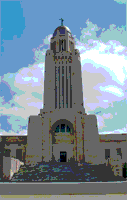Center, Public Policy, University of Nebraska

University of Nebraska Public Policy Center: Publications
Date of this Version
2019
Citation
Published in Art from Trauma: Genocide and Healing Beyond Rwanda, ed. Rangira Béa Gallimore & Gerise Herndon. University of Nebraska Press, Lincoln, 2019.
Abstract
When Laura Roost and Ryan Lowry returned from their respective graduate fieldwork in Rwanda and the Balkans, their excited but bewildered debriefings were met by Professors Chantal Kalisa and Patrice McMahon, smiling and shaking their heads. Combined, Kalisa and McMahon had had extensive fieldwork experience in Africa, Europe, and Asia, and they saw in this debrief that the next generation of scholars was experiencing the same bittersweet realities of fieldwork that keeps researchers returning to the field despite ambiguities and frustrations. In an ever-connected world, doing fieldwork is necessary even when it seems redundant. Scholars now have large and accessible data sets as well as repositories for primary documents that provide rich details of events on the ground, and graduate students feel the pull to avoid the financial and time costs of fieldwork in favor of these readily accessible data sets. This ambivalence about fieldwork holds true when researching war or economic development as much as it does when researching human rights, ethnic conflict, and even societal peace-issues of concern to all of us. Research on the merits and challenges of fieldwork is abundant. Logistical how-tos of fieldwork are also plentiful. Kalisa's approach to both fieldwork and study abroad contributes crucial insight. Besides practical concerns, Kalisa was careful to ensure that her undergraduate study abroad students and graduate-level junior researchers all knew the importance of conscientious research.
Included in
Political Science Commons, Public Affairs, Public Policy and Public Administration Commons


Comments
Copyright © 2019 Board of Regents of the University of Nebraska.